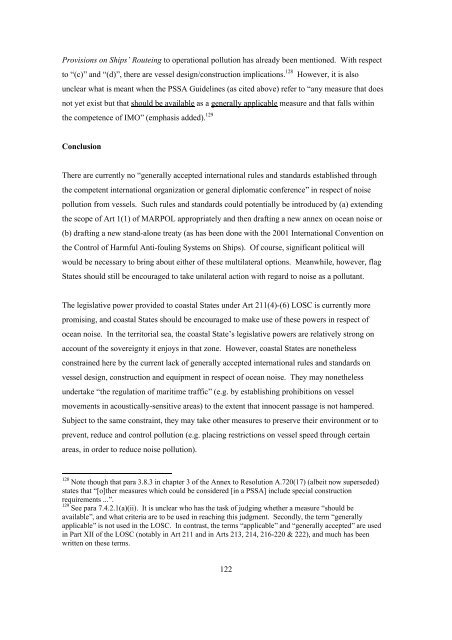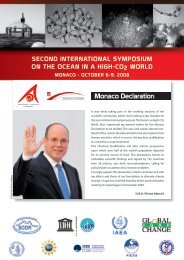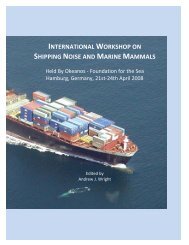Oceans of noise - Whale and Dolphin Conservation Society
Oceans of noise - Whale and Dolphin Conservation Society
Oceans of noise - Whale and Dolphin Conservation Society
- No tags were found...
You also want an ePaper? Increase the reach of your titles
YUMPU automatically turns print PDFs into web optimized ePapers that Google loves.
Provisions on Ships’ Routeing to operational pollution has already been mentioned. With respectto “(c)” <strong>and</strong> “(d)”, there are vessel design/construction implications. 128 However, it is alsounclear what is meant when the PSSA Guidelines (as cited above) refer to “any measure that doesnot yet exist but that should be available as a generally applicable measure <strong>and</strong> that falls withinthe competence <strong>of</strong> IMO” (emphasis added). 129ConclusionThere are currently no “generally accepted international rules <strong>and</strong> st<strong>and</strong>ards established throughthe competent international organization or general diplomatic conference” in respect <strong>of</strong> <strong>noise</strong>pollution from vessels. Such rules <strong>and</strong> st<strong>and</strong>ards could potentially be introduced by (a) extendingthe scope <strong>of</strong> Art 1(1) <strong>of</strong> MARPOL appropriately <strong>and</strong> then drafting a new annex on ocean <strong>noise</strong> or(b) drafting a new st<strong>and</strong>-alone treaty (as has been done with the 2001 International Convention onthe Control <strong>of</strong> Harmful Anti-fouling Systems on Ships). Of course, significant political willwould be necessary to bring about either <strong>of</strong> these multilateral options. Meanwhile, however, flagStates should still be encouraged to take unilateral action with regard to <strong>noise</strong> as a pollutant.The legislative power provided to coastal States under Art 211(4)-(6) LOSC is currently morepromising, <strong>and</strong> coastal States should be encouraged to make use <strong>of</strong> these powers in respect <strong>of</strong>ocean <strong>noise</strong>. In the territorial sea, the coastal State’s legislative powers are relatively strong onaccount <strong>of</strong> the sovereignty it enjoys in that zone. However, coastal States are nonethelessconstrained here by the current lack <strong>of</strong> generally accepted international rules <strong>and</strong> st<strong>and</strong>ards onvessel design, construction <strong>and</strong> equipment in respect <strong>of</strong> ocean <strong>noise</strong>. They may nonethelessundertake “the regulation <strong>of</strong> maritime traffic” (e.g. by establishing prohibitions on vesselmovements in acoustically-sensitive areas) to the extent that innocent passage is not hampered.Subject to the same constraint, they may take other measures to preserve their environment or toprevent, reduce <strong>and</strong> control pollution (e.g. placing restrictions on vessel speed through certainareas, in order to reduce <strong>noise</strong> pollution).128 Note though that para 3.8.3 in chapter 3 <strong>of</strong> the Annex to Resolution A.720(17) (albeit now superseded)states that “[o]ther measures which could be considered [in a PSSA] include special constructionrequirements ...”.129 See para 7.4.2.1(a)(ii). It is unclear who has the task <strong>of</strong> judging whether a measure “should beavailable”, <strong>and</strong> what criteria are to be used in reaching this judgment. Secondly, the term “generallyapplicable” is not used in the LOSC. In contrast, the terms “applicable” <strong>and</strong> “generally accepted” are usedin Part XII <strong>of</strong> the LOSC (notably in Art 211 <strong>and</strong> in Arts 213, 214, 216-220 & 222), <strong>and</strong> much has beenwritten on these terms.122




